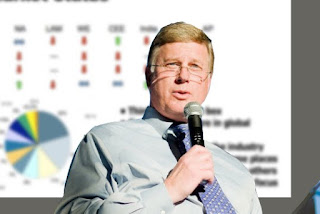 Internal speakers get a bad rap.
Internal speakers get a bad rap.Not to say that it isn't largely deserved; for the most part, internal company speakers are what one talks about when they reference such phrases as, "Death by PowerPoint" or "Information Overload" or "Podium Ambien". (Okay, so I made that last one up.)
Professional speakers--again, only for the most part--manage to avoid such pitfalls. That's not to say there aren't exceptions to the rule: I've seen fabulous internal presenters and pretty lousy professional keynote speakers. It's just that when one makes their living doing something, they tend to do it fairly well. A company probably didn't hire a CFO to give an ace 50-minute presentation once a year at a sales meeting...they probably hired them to be really, really good at company finances. So presenting really *isn't* an internal speaker's main job--they already have a job to do, and one can hardly blame them for giving a comparatively small presentation the short shift when their main focus is on their daily responsibilities.
Recently I stumbled on a discussion of event industry professionals centered around poor presenters. The general consensus was that companies should hire professional presenters to escape from the trap of sub-par internal speakers.
Well, that might work for a keynote speech, of course, but I would say that not only is this financially prohibitive on a bigger scale, but it's also unrealistic, largely unnecessary and can take away a lot from the meeting--including critical information. After all--if you need someone to give the financial picture for the company moving forward, the best person to do it is someone internally who deals with that particular facet.
I'm not that quick to brush off internal speakers all together. There are definitely ways to coax a more engaging presentation out of a non-professional speaker:
Make it an Interview. A dialog can be much more captivating than a monologue. Have an emcee or dynamic colleague ask the presenter pointed, relevant questions. Keep the conversation focused and moving along.
If one is feeling like doing something different for an event, one could even stage the general session like a talk show--keeping the same emcee to transition between different subject matter experts.
Present as a Team. The head of a department can give a brief overview, and then hand off to members of their team to present--or presenters can take turns. Not only does this change who's on stage--adding novelty and re-engaging the audience every time the presenter changes--but it can also be a great opportunity to let a team share in the "glory" and let themselves be known to the audience.
Keep it High-Level. Internal speakers are often subject matter experts that spend all of their days doing their job in the area that they are speaking about. It's great that they're passionate and knowledgeable about their subject--but it's not often that the audience shares the same level of enthusiasm. For instance--a sales force doesn't want to (or need to) know *all* the little nuances of the marketing process and department and plan--they just need to know the parts that are relevant to them and will help them most in their job. Information overload can be prevented by keeping everything very high level--the presenter should think about what's important to the audience as opposed to what's important to them.
Add Variety and Multimedia and Novelty. There's nothing more compelling than a story--and internal speakers are full of them; they just don't know it. Stories, metaphors, pictures, video clips--all these tools can be incorporated into presentations to significantly boost the engagement factor. A story doesn't have to be a personal anecdote--sometimes a presentation *does* tell a story if framed correctly. Instead of clip-art pictures, use bold, big, colorful and memorable graphics. (And take out some of the PowerPoint text while you're at it.)
Case studies are also great. A presenter doesn't have to tell the audience how program X will benefit them--give a case study. Better yet, call the case study subject on stage to interject their story during the presentation. Variety, multimedia and novelty are all key in keeping the audience off the Blackberry and on the presenter.
Have a global, pre-defined and assigned set of outcomes. Having a set of clear outcomes for an event is huge. Define outcomes and give them to presenters. If they want to talk about something, it must somehow support one of the outcomes. If it doesn't, they either cut that information, or renegotiate. Every presentation should support the event--and having a cohesive set of outcomes both within the event and within each presentation will keep everyone on-message (and prevent speaker-speech-wander). Don't be afraid to cut time when it's not needed--just because you've always allotted 90 minutes for the marketing team, doesn't mean they have 90 minutes of relevant, outcome-based content THIS year.
Rehearse. It's torture to sit through an already-dry presentation only to be confronted with technical glitches, "What happened to my slide? Can you go back one?", and unprepared speakers. Internal speakers have regular jobs within the company, so they're not always given adequate time to rehearse. This isn't just an on-site task, by the way. Reviewing their presentation as they go along with a trusted peer, team-member or assistant (anyone with an honest, knowledgeable, critical eye) can keep it on-point and fresh.
Toss the PowerPoints. Look. I've heard it hundreds of times; "Well, [CEO, CFO, CMO, VP, Etc.] is just going to do his/her slides on the plane before the event...so there's not much *we* can do about it..." Not only does this tie in with not rehearsing, but if a presenter doesn't have time to prepare in advance--cut the slides! Not only do night-before slides have infinitely more mistakes, but they're also much more likely to contain the speech instead of being a speaking aid. Consider supplementing PowerPoints with handouts, or even a recording of the presentation (or presentation notes) on a website after the event.

No comments:
Post a Comment